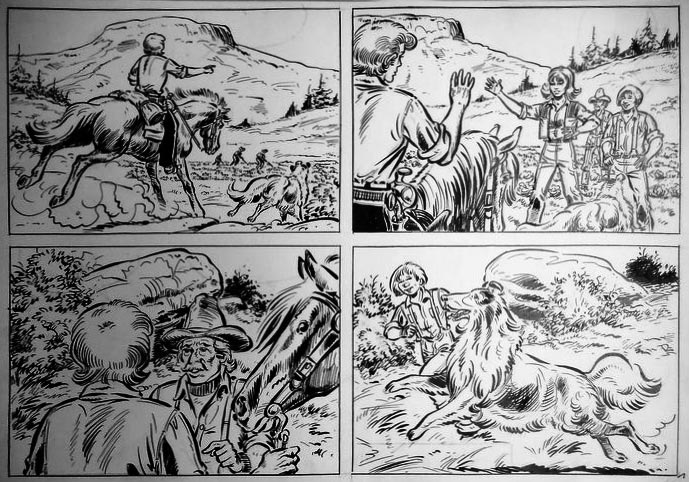Panel from the German 'Bessy' story 'Het Rijdende Fort' (1978, Flemish working title).
Jean Bosco Safari is a Belgian-Rwandan pop singer, better known as Kid Safari, who has released several albums since 1989. Between 1976 and 1983 he was one of the pencil artists at Willy Vandersteen's Bessy Studio in Antwerp, where he worked for the weekly 'Bessy' production for the German Bastei Verlag.
Early life
Bosco Safari was born in 1954 in Rubago, Rwanda, as the son of a black mother and white father. Since at the time this was considered shameful, Safari's father fled back to Belgium. Safari never knew his father. Until he was six, he lived in a typical rural community. By 1959, the cry for independence caused huge riots in Rwanda and Congo. Safari's family was brought to a refugee camp. Afterwards, all half-blood children (Safari himself prefers the term "double blood") were sent to adoption families in Belgium. As she was illiterate, his mother had no say in this matter, and signed the papers with a simple thumbprint. On 1 July 1960, around the time that Congo and Rwanda became independent, Safari was adopted by the Flemish Vijdt-Vandamme family in Merksem. His adoptive name was Johan Vijdt, but everyone called him Jean. It wasn't until 1995 when he learned about his full background and officially returned to his original Rwandan name.
Interviewed by Frederick Vandromme and Katia Vlerick in Humo issue #4201 (9 March 2021), Safari said that the Belgian government and Catholic authorities made it extraordinarily difficult to trace information about these white Belgian men who had conceived children with black Rwandan and Congolese wives, especially regarding inheritance: "It's really all a cover-up." It took until 2019 before the classified files of his adoption were finally made public. Only then he found out the names of his biological parents. His mother had long ago passed away. His father too, presumably, but this was said about all white Belgian fathers in the files, so there was no certainty on that part. Safari also noticed a lot of contradictions and unreliable claims. The authorities had asked his mother how many times she had sex with his father. Since she couldn't calculate, they simply wrote down a number of their own choice. Most of the information in the files deliberately tried to paint Congolese women in a bad light, justifying the separation and forcing the adoption of their offspring.
Early comics career
As a young man, Jean Bosco Safari showed a talent for both music and drawing. At age 12, he already went to art school, where one of his teachers was Frank-Ivo Vandamme. At age 16 he however decided he wanted to become a musician, and played the guitar with a local band in Brasschaat. Living in Antwerp from the age of 21 on, Safari noticed it was difficult to make a living as a musician. He returned to drawing and through his friend Robert Wuyts he got a job at Frank Sels' studio, where the 'Silberpfeil' stories for the German market were produced.
Studio Bessy
Together with Robert Wuyts, Safari later joined Studio Bessy at Gretrystraat 15 in Antwerp in 1976. Ever since 1967, the team there was fully devoted to the story production of Willy Vandersteen's western series 'Bessy' for the German market. Safari was hired as a penciller, and remained with the studio until 1983, first under supervision of Jeff Broeckx, then of Ron van Riet. Every week, the team cranked out a complete adventure of Andy and his Scotch Collie Bessy for the publishing house Bastei Verlag. With such a high production schedule, quantity became more important than quality. To keep up with the workload, the studio hired several scriptwriters, pencillers, inkers and general handymen throughout its existence. It is difficult to identify who did exactly what, although some pages of the 790th(!) story 'Im Bann des Silberlöwen' (Bessy #769 at Bastei) were up for auction at Catawiki.com in 2018 and credited to Bosco Safari. Around the same period, Bobbedoes.nl had pages for auction from the 1978 story 'Het Rijdende Fort' (Flemish working title), also attributed to him.
Musical career
When the 'Bessy' production for Germany slowed down, Bosco Safari left the studio and completely focused on his musical career. In the early 1980s, he formed the ska/pop group Heartbreak with guitar player Fred Bekky (a former member of The Pebbles) and drummer Patrick Deweert, with whom he released one album, 'Heartbreak Motel' (1982), and a handful of singles. Thijs van Leer (of the Dutch band Focus), played the keyboards. John Vijdt, as he was credited at the time, also penned a couple of synth pop songs for some obscure artists, but overall it didn't exactly make him a fortune. His luck changed in 1989 when he met Tina Turner's piano player Kenny Moore. Moore produced his debut album 'Wow' (1989), released under the artist's name Kid Safari. The song 'My Eyes' became a number 1 hit in South Africa. His second album, 'The Romantic Heroes', followed in 1993, and produced by British songwriter and arranger Robyn Smith. With his third album, 'Little Boy Blue', Kid Safari turned to more dark and introspective songwriting. This path was continued in his next albums 'Visions of Home' (1997), 'NOMAD' (2003 and 'Private Revolution' (2008), all more personal records with more ethnic influences.
A committed musician, Jean Bosco Safari has regularly given charity concerts for various humanitarian projects and organizations in developing countries.
Bessy - 'Im Bann des Silberlöwen'.




